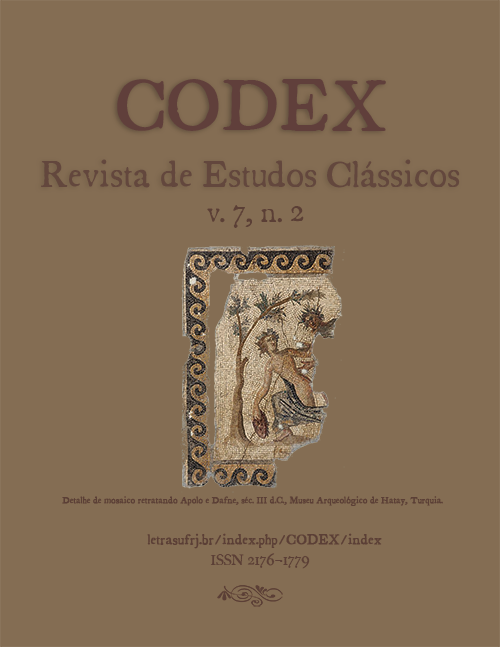“Golden Aphrodite” and Zeus’s cosmic order in Hesiodic poetry
DOI:
https://doi.org/10.25187/codex.v7i2.29684Keywords:
Aphrodite, Hesiodic poetry, race of the heroes, prodigious creatures, Zeus’s cosmic orderAbstract
After a brief presentation about the notion of formula, this paper argues that Aphrodite, mainly when presented under the formula χρυσέην Ἀφροδίτην, is essential for the understanding of the dynamics of the race of the heroes and Zeus’s decision to put an end to it in Greek early hexameter poetry. Associated with the preposition διά, this theonimic formula is used in contexts where beings that threaten the order and power of Zeus are born, the race of heroes included.References
BOEDEKER, Deborah D. Aphrodite’s entry into Greek epic. Leiden: Brill, 1974
CÀSSOLA, Filippo. Inni omerici. Milão: Fondazione Lorenzo Valla, 1975
CLAY, Jenny S. The beginning and end of the Catalogue of Women and its relation to Hesiod In: HUNTER, Richard. (Org.) The Hesiodic Catalogue of Women: constructions and reconstructions. New York: Cambridge University Press, 2005, pp.25-34.
______. Hesiod’s Cosmos. Cambridge: Cambridge University Press, 2003.
FOLEY, John M. Homer’s traditional art. Pennsylvania: The Pennsylvania State University Press, 1999.
GRAZIOSI, Barbara; HAULBOLD, Johannes. The Resonance of Epic. London: Duckworth, 2005.
HUNTER, Richard. (org.) The Hesiodic Catalogue of Women: constructions and reconstructions. New York: Cambridge University Press, 2005.
KONING, Hugo. Helen, Herakles, and the end of the heroes. In: TSAGALIS, C. (org.) Poetry in fragments: Studies on the Hesiodic corpus and its afterlife. Berlin: De Gruyter, 2017, p. 99-114.
LAFER, Mary M. C. N. Engenhos da sedução: Estudo sobre o Hino Homérico a Afrodite. 152 p. Tese (Doutorado em Língua e Literatura Grega) - Faculdade de Filosofia, Letras e Ciências Humanas, Universidade de São Paulo, São Paulo, 2005.
LORD, Albert. The singer of tales. Nova Iorque: Atheneum, 1971.
MOST, Glenn W. Hesiod: The Shield; Catalogue of Women; Other Fragments. London: Harvard Universty Press, 2007
NAGY, Gregory. The Epic Hero. Washington: Center for Hellenic Studies, 2006. Disponível em <http://nrs.harvard.edt/urn-3:hlnc.essay:Nagy.The_ Epic _Hero.2005>. Acesso em: 01 out. 2019.
PARRY, Milman. The making of Homeric verse. Oxford: Oxford University Press, 1971.
TSAGALIS, C. (org.) Poetry in fragments: Studies on the Hesiodic corpus and its afterlife. Berlin: De Gruyter, 2017
WERNER, Christian. Hesíodo: Teogonia. São Paulo: Hedra, 2013a.
______. Hesíodo: Trabalhos e Dias. São Paulo: Hedra, 2013b.
ZANON, Camila A. Onde vivem os monstros: criaturas prodigiosas na poesia de Homero e Hesíodo. São Paulo: Humanitas, 2018.
Downloads
Published
How to Cite
Issue
Section
License
This work is licensed under a Creative Commons Attribution-NonCommercial 4.0 International License.










